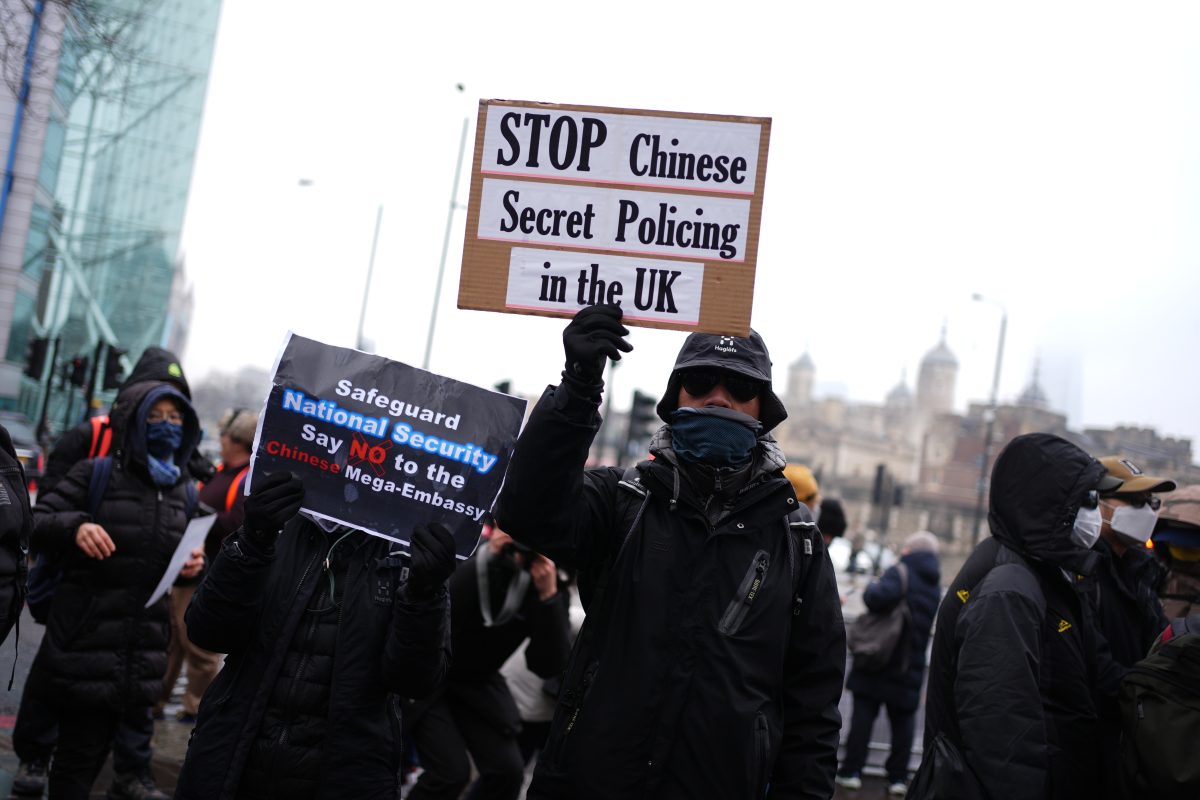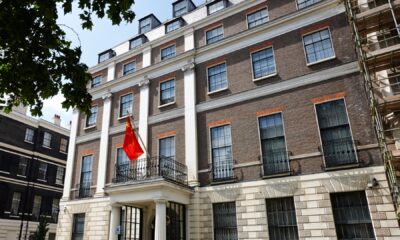Politics
City of London Voices Concerns Over New Chinese Embassy Plans

The City of London Corporation has raised significant concerns regarding the proposed development of a new Chinese embassy at Royal Mint Court, near the financial district. Senior officials have expressed alarm over potential security risks related to sensitive infrastructure, including fibre-optic cables that run beneath the site.
Professor Sophia Economides, head of engineering at Northeastern University London, highlighted the technical implications of the embassy’s location. While she could not definitively state that the site was unsafe, she noted that the situation “raises legitimate technical concerns.” She explained, “There are fibre-optic cables that go under the site… it’s very easy to tap into those cables, it’s very easy to see what’s happening – and it won’t be detected.”
The planning application for the embassy was initially submitted to Tower Hamlets, the neighbouring borough, without direct involvement from the City of London. Nonetheless, one senior member of the City’s governing authority expressed their deep concerns about the proposed site’s proximity to critical financial infrastructure. They remarked, “The cable issue is a concern and it does ring alarm bells that they’re pushing very hard for this particular site,” adding, “You have to wonder why that is.”
Another elected member voiced similar reservations, describing the embassy as a “possible spy-stronghold” that could “invite mischief” due to its closeness to sensitive data cables. A source within the Corporation admitted to feeling “nervous about the threat from the Chinese in general,” saying it was “very odd that they clearly want this particular site.” They acknowledged the necessity of engaging in business with China but urged for a more cautious approach.
The City’s apprehensions have been echoed by senior Conservative MPs Alicia Kearns and Tom Tugendhat, who have publicly stated that they believe they were targets of Chinese espionage. They have called on the government to block the application for the new embassy and to elevate China in the Foreign Influence Registration Scheme, placing it on par with Russia and Iran. In a letter to Keir Starmer, they criticized the government’s handling of espionage cases, asserting, “Failing to prosecute two men charged with spying for China demonstrates worrying levels of complacency.”
The government has delayed its decision on the planning application until December 10, 2023, prompting a strong reaction from Chinese officials. They warned that the UK would face “consequences” if permission for the embassy was not granted.
In response, a spokesperson for the Chinese Embassy in the UK asserted that the Chinese government purchased the Royal Mint Court in 2018 for the construction of the new embassy. They claimed that the UK government had previously consented to this acquisition and that the current planning application adhered to local regulations. The spokesperson dismissed concerns over security, stating, “The claim that China’s new embassy project poses a potential security risk to the UK is completely groundless and malicious slander.”
The City of London Corporation has opted not to comment further on the matter, leaving the future of the proposed embassy shrouded in uncertainty as discussions continue.
-

 Entertainment3 months ago
Entertainment3 months agoAnn Ming Reflects on ITV’s ‘I Fought the Law’ Drama
-

 Entertainment4 months ago
Entertainment4 months agoKate Garraway Sells £2 Million Home Amid Financial Struggles
-

 Health3 months ago
Health3 months agoKatie Price Faces New Health Concerns After Cancer Symptoms Resurface
-

 Entertainment3 months ago
Entertainment3 months agoCoronation Street’s Carl Webster Faces Trouble with New Affairs
-

 Entertainment2 weeks ago
Entertainment2 weeks agoCoronation Street Fans React as Todd Faces Heartbreaking Choice
-

 Entertainment3 months ago
Entertainment3 months agoWhere is Tinder Swindler Simon Leviev? Latest Updates Revealed
-

 World2 weeks ago
World2 weeks agoBailey Announces Heartbreaking Split from Rebecca After Reunion
-

 Entertainment4 months ago
Entertainment4 months agoMarkiplier Addresses AI Controversy During Livestream Response
-

 Science1 month ago
Science1 month agoBrian Cox Addresses Claims of Alien Probe in 3I/ATLAS Discovery
-

 Health5 months ago
Health5 months agoCarol Vorderman Reflects on Health Scare and Family Support
-

 Entertainment4 months ago
Entertainment4 months agoKim Cattrall Posts Cryptic Message After HBO’s Sequel Cancellation
-

 Entertainment3 months ago
Entertainment3 months agoOlivia Attwood Opens Up About Fallout with Former Best Friend



















